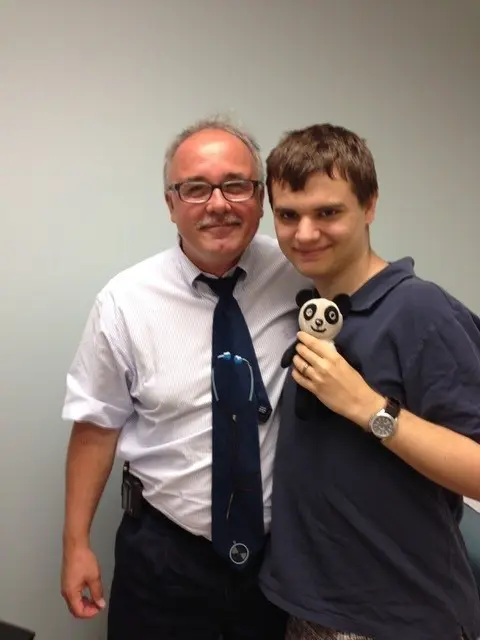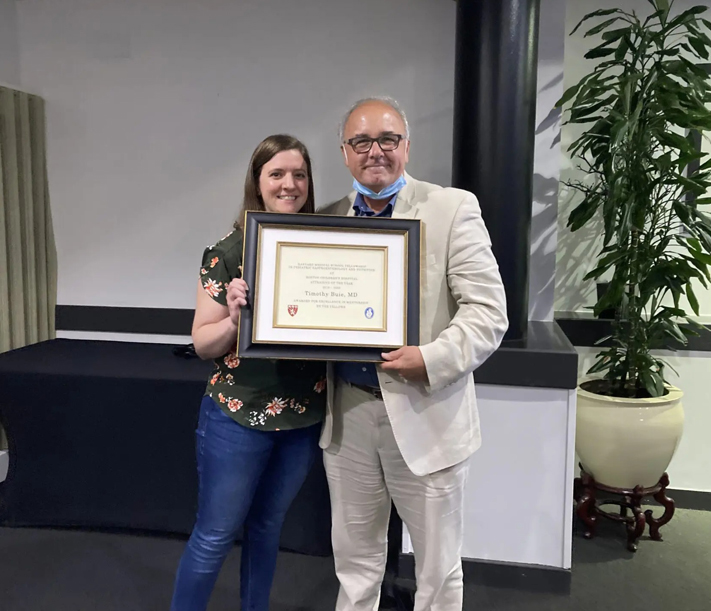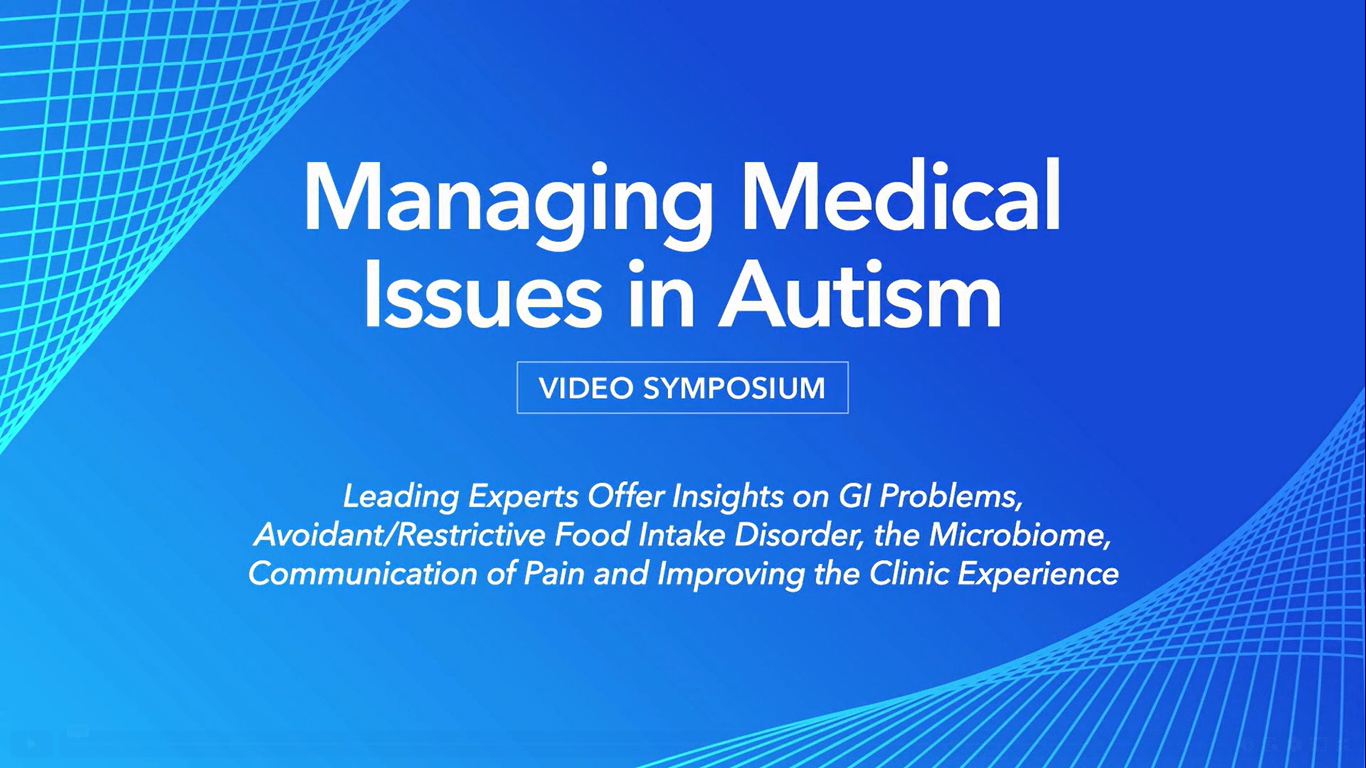Dr. Tim Buie
Dr. Tim Buie talks with Dr. Sonia Ballal after her video presentation on Treating GI Problems and Autism.
Dr. Tim Buie on the studio set filming the Managing Medical Issues in Autism video series.

I have been focused on caring for individuals with Autism since 1998. Walter is an old friend who has been in my practice these many years. I have known him since he was 7 and have watched him grow into a phenomenal young man.

Melissa Musser was a GI Fellow at Boston Children’s Hospital when she presented Dr. Tim Buie with the Attending of the Year award at the Harvard Medical School Fellowship Graduation dinner. She is now an accomplished attending at BCH.
Read the new blog by Dr. Tim Buie:
Cures and Causes of Autism: Beyond Speculation
Great news! Managing Medical Issues in Autism videos are now available to see for free on Boston Children’s Hospital's YouTube channel here The videos can also be found on YouTube.com by searching “Boston Children’s Hospital GI-Autism Tim Buie.” These 30-minute videos are presented by experts discussing topics such as pain management, behaviors in autism, the microbiome, ARFID, and GI treatments. My favorite part is at the end of each video presentation, I have a conversation with the presenter to explore more about their work with the autism community. I developed this video series for families and caregivers, students, healthcare professionals, and anyone who cares for an individual with autism. Whether you watch one video or all of them, I hope you find the information helpful.
The Managing Medical Issues in Autism medical video courses continue to be available for CMEs/CEs
Boston Children’s Hospital has recently appointed me as Co-Director of the GI-Autism Clinic
Managing Medical Issues in Autism accredited on-demand video courses are featured on the Boston Children’s Hospital Continuing Education website and available here
Managing Medical Issues in Autism is a series of five independent video courses that explores the relationship between autism and gastroenterology/nutrition, and the challenges of communicating pain and illness for individuals with autism. As the developer and course director of this video series, I am also one of the presenters. Use these discount codes when registering: mmia1x5 for individual courses or mmia5 for the 5-course bundle.
New Hot Topic: I wanted to post a Hot Topic that may be more of a simmering issue for those with autism who have lived with medical problems over the years: How can we improve clinical care during office visits? This topic is discussed in an article I co-authored with Dr. Kara Margolis, Director of the NYU Pain Research Center entitled “Considerations for Treating Autistic Individuals in Gastroenterology Clinics,” which was recently published in The Lancet Gastroenterology and Hepatology journal.
In honor of Autism Awareness Month, the Office for External Education at Harvard Medical School (HMS) has introduced a valuable resource for the adult autism community: Adult Autism Health Resources www.adult-autism.health.harvard.edu. I am featured on the home page of this resource website in a two-minute video talking about the important role caregivers provide with a link to an article on “Common Gastrointestinal Conditions” in people with autism.
Just published: Comparing Gastrointestinal Endoscopy Findings in Children with Autism, Developmental Delay or Typical Development
I am so pleased to let everyone know about a recent article in the Journal of Pediatrics featuring the largest published endoscopy study in autism and a comparative review of its findings.
Recently Published: Recommendations for the Management of Diarrhea with Trofinetide use in Rett Syndrome provided by medical specialists
"Recommendations for the Management of Diarrhea with Trofinetide use in Rett Syndrome" was recently published in the journal Expert Opinion on Orphan Drugs, and I was pleased to participate as one of the authors.
New Study Supports BRAVO pH Probe Testing in Children with Autism
My thanks to Leonel Rodriguez, chief of pediatric gastroenterology, Yale Medicine, for shepherding this paper on Evaluation of Gastroesophageal Reflux ...
An effective tool “Characteristics of the Autism Spectrum Disorder Gastrointestinal and Related Behaviors Inventory in Children” featured in the Journal of Autism, is available to download.
Welcome
I am Dr. Tim Buie, the Co-Director of the GI-Autism Clinic and Senior Physician in the Pediatric Gastroenterology, Nutrition and Hepatology department at Boston Children’s Hospital I am also an Assistant Professor at Harvard Medical School. I’ve been in this ever-changing field of medicine for the past 37 years.
When I did my Fellowship in Pediatric Gastroenterology at Yale University School of Medicine, it was a new specialty growing out of the need to address medical issues in infants through adolescents who are experiencing gastrointestinal issues. I was fortunate to train with the pioneers of pediatric gastroenterology, which includes my mentor Dr. Joyce Graboski.
I must be pretty old, you might be thinking, but I don’t consider myself ancient. My training in medicine started at the age of 18 in a unique 6-year medical program at the University of Missouri-Kansas City School of Medicine.
Once again, I was lucky enough to be trained by the best teachers who prepared me for my residency at Bridgeport Hospital/Yale University in Internal Medicine and Pediatrics, which is a specialty to provide whole-life care.
There is more about my training and what I have achieved over the years in my Bio along with a list of my published research articles offering viewable abstracts.
I invite you to explore this website and use the information and tools provided. Scroll down this page and view a two-page Pediatric Screening Form for Common GI Disorders, which you can download for free.
There’s also a section called Hot Topic, which will review current questions that are being researched.
Welcome
I am Dr. Tim Buie, a pediatric gastroenterologist at Boston Children’s Hospital and an Assistant Professor at Harvard Medical School. I’ve been in this ever-changing field of medicine for the past 30 years.
When I did my Fellowship in Pediatric Gastroenterology at Yale University School of Medicine, it was a new specialty growing out of the need to address medical issues in infants through adolescents who are experiencing gastrointestinal issues. I was fortunate to train with the pioneers of pediatric gastroenterology, which includes my mentor Dr. Joyce Graboski.
I must be pretty old, you might be thinking, but I don’t consider myself ancient. My training in medicine started at the age of 18 in a unique 6-year medical program at the University of Missouri-Kansas City School of Medicine. Once again, I was lucky enough to be trained by the best teachers who prepared me for my residency at Bridgeport Hospital/Yale University in Internal Medicine and Pediatrics, which is a specialty to provide whole-life care.
There is more about my training and what I have achieved over the years in my Bio along with a list of my published research articles offering viewable abstracts.
I invite you to explore this website and use the information and tools provided. Scroll down this page and view a two-page Pediatric Screening Form for Common GI Disorders, which you can download for free.
There’s also a section called Hot Topic, which will review current questions that are being researched.
What can this Web site do for you?
First of all, I’ll tell you what I cannot do: I cannot book appointments or provide individual medical advice. Should you wish to contact the Pediatric Gastroenterology department at Boston Children’s Hospital to schedule an appointment, you can request an appointment online by clicking here.
I can offer you information that relies on solid research or what has worked clinically with patients.
I can provide perhaps new ways of approaching a child experiencing GI issues that may prove helpful on how you work with your pediatrician or specialist.
Although my specialty is with individuals with autism who are dealing with GI symptoms and identified conditions, a lot of information can be applied to the medical management of all children with GI problems.






